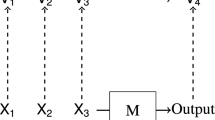Abstract
In this paper, we analyse actual causation in terms of production. The latter concept is made precise by a strengthened Ramsey Test semantics of conditionals: \(A \gg C\) iff, after suspending judgement about A and C, C is believed in the course of assuming A. This test allows us to (epistemically) verify or falsify that an event brings about another event. Complementing the concept of production by a weak condition of difference-making gives rise to a full-fledged analysis of causation.
Similar content being viewed by others
Notes
Gärdenfors (1986) has proven a triviality theorem concerning the Ramsey Test, after a conditional logic was developed on the basis of this test in Gärdenfors (1979). Recently, however, there have been various, apparently successful attempts at defending the Ramsey Test in light of this result [see, e.g., Bradley (2007)]. We show that our strengthened Ramsey Test does not imply triviality in Andreas and Günther (2018a). The following section draws on this paper, where the conditional \(\gg \) has been defined for the first time.
In the Treatise, Hume (1739/1978, p. 170, our emphasis) defines: “A cause is an object precedent and contiguous to another, and so united with it, that the idea of the one determines the mind to form the idea of the other”. In more modern terms, if an event C precedes another E (and is contiguous), Hume calls C a cause of E iff C is an epistemic reason for E. Observe that the notion of causation is relative to a ‘mind’.
A diagram of a model \({\mathcal {A}}\) is the set of all closed literals (in a given language) that are true in \({\mathcal {A}}\). The notion of a first order diagram has a clear analogue for propositional languages. In the case of propositional logic, a diagram contains for any propositional constant A, either A or \(\lnot A\). Such a diagram represents a valuation of a language of propositional logic.
Many thanks to an anonymous referee for pointing our attention to scenarios of the present type.
In Andreas and Günther (2018b), we defined the strengthened Ramsey Test in the framework of causal models by Halpern and Pearl (2005). Thereby, we put forth a variant of the present analysis of actual causation in terms of causal models. The analysis there is not reductive since structural equations of a causal model are presumed to encode primitive causal relations.
References
Alchourrón, M. A., Gärdenfors, P., & Makinson, D. (1985). On the logic of theory change: Partial meet contraction functions and their associated revision functions. Journal of Symbolic Logic, 50, 510–530.
Andreas, H., & Günther, M. (2018a). On the Ramsey Test analysis of ‘Because’. Erkenntnis. https://doi.org/10.1007/s10670-018-0006-8.
Andreas, H., & Günther, M. (2018b). A Ramsey Test analysis of causation for causal models. The British Journal for the Philosophy of Science. https://doi.org/10.1093/bjps/axy074.
Andreas, H. (2019). Explanatory conditionals. Philosophy of Science, 86(5).
Beckers, S., & Vennekens, J. (2017). The transitivity and asymmetry of actual causation. Ergo: An Open Access Journal of Philosophy, 4, 1–27.
Beckers, S., & Vennekens, J. (2018). A principled approach to defining actual causation. Synthese, 195(2), 835–862.
Bradley, R. (2007). A defence of the ramsey test. Mind, 116(461), 1–21.
Gärdenfors, P. (1979). Conditionals and changes of belief. In I. Niiniluoto, R. Tuomela, (Eds.), The logic and epistemology of scientific change. Volume 30 of Acta philosophica fennica (pp. 381–404). Amsterdam: North-Holland Publishing Company.
Gärdenfors, P. (1986). Belief revisions and the ramsey test for conditionals. The Philosophical Review, 95(1), 81–93.
Gärdenfors, P. (1988). Knowledge in flux. Cambridge, MA: MIT Press.
Hall, N. (2007). Structural equations and causation. Philosophical Studies, 132(1), 109–136.
Hall, N. (2004). Two concepts of causation. In John Collins, Ned Hall, & Laurie Paul (Eds.), Causation and counterfactuals (pp. 225–276). Cambridge: The MIT Press.
Halpern, J . Y., & Pearl, J. (2005). Causes and explanations: A structural-model approach. Part I: Causes. British Journal for the Philosophy of Science, 56(4), 843–887.
Hansson, S. O. (1999). A textbook of belief dynamics. Theory change and database updating. Dordrecht: Kluwer.
Hansson, S. O. (1992). In defense of the ramsey test. Journal of Philosophy, 89(10), 522–540.
Hitchcock, C. (2001). The intransitivity of causation revealed in equations and graphs. Journal of Philosophy, 98(6), 273–299.
Hume, D. (1739/1978). A treatise of human nature. Oxford: Clarendon Press.
Lewis, D. (1973). Causation. Journal of Philosophy, 70(17), 556–567.
Lewis, D. (1986). Postscripts to “causation”. In D. Lewis (Ed.), Philosophical papers (Vol. II, pp. 172–213). Oxford: Oxford University Press.
Paul, L. A., & Hall, N. (2013). A user’s guide. Causation: Oxford University Press.
Ramsey, F. P. (1929/1990). General propositions and causality. In Philosophical papers (pp. 145–163).
Rott, H. (1986). Ifs, though, and because. Erkenntnis, 25(3), 345–370.
Sartorio, C. (2005). Causes as difference-makers. Philosophical Studies, 123(1), 71–96.
Spohn, W. (2006). Causation: An alternative. British Journal for the Philosophy of Science, 57(1), 93–119.
Stalnaker, R. (1968). A theory of conditionals. In N. Rescher (Ed.), Studies in logical theory (American philosophical quarterly monograph series) (Vol. 2, pp. 98–112). Oxford: Blackwell.
Woodward, J. (2003). Making things happen: A theory of causal explanation. Oxford: Oxford University Press.
Acknowledgements
We would like to thank Hannes Leitgeb and Andrew Irvine for very valuable advice on earlier versions of the paper. Special thanks are also due to Hans Rott and Paul Bartha for very helpful comments on presentations of the paper. Finally, we are indebted to the anonymous referees for Philosophical Studies. Their comments greatly helped us improve the paper. This research has been supported, in part, by the Graduate School of Systemic Neurosciences.
Author information
Authors and Affiliations
Corresponding author
Additional information
Publisher's Note
Springer Nature remains neutral with regard to jurisdictional claims in published maps and institutional affiliations.
Rights and permissions
About this article
Cite this article
Andreas, H., Günther, M. Causation in terms of production. Philos Stud 177, 1565–1591 (2020). https://doi.org/10.1007/s11098-019-01275-3
Published:
Issue Date:
DOI: https://doi.org/10.1007/s11098-019-01275-3



